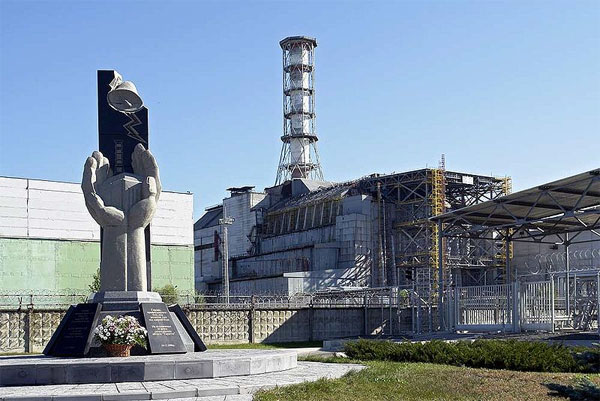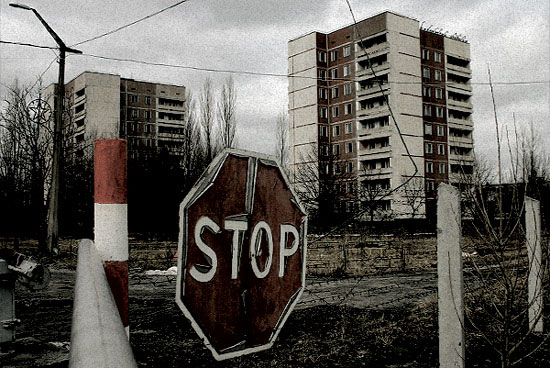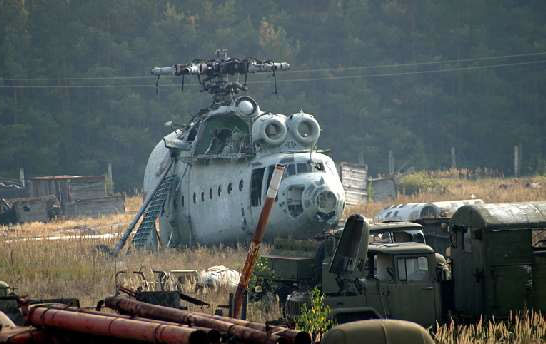
Remembering the Invisible
/ Главная / Russkiy Mir Foundation / Publications / Remembering the InvisibleRemembering the Invisible

April 26, 1986, was a watershed date. Few who were born after these events, which forced the entire world to learn the Slavic word Chernobyl, can fully understand the shock faced then by the planet.
Chernobyl is a type of grass that grows almost unnoticed. It grows just south of Polesia, the forested zone of southern Belarus and northwestern Ukraine. The four block nuclear power state was set up on the boundary of this zone and named after a miniscule village in the area which took its name from the grass.
By 1986 had already become apparent to all that there probably would not be any nuclear war. The number of zinc coffins from Afghanistan was steadily increasing, as the du
The town of Pripyat was ruined because the state found it more advantageous to simultaneously build the industrial facility and residential buildings. That’s how things were done. For example, blast furnaces were set up in the center of the city of Magnitogorsk, and now in the 21st century people are surprised to discover that city residents are suffering from lung disease. There are other reactors of the Chernobyl type in operation, for example, in Finland, but the difference is that there is no one living in the vicinity.
Everyone knows what happened at the station – the fire, the release of steam and subsequent radioactive cloud. But who it happened like this – nobody knows, although investigating commission found some people guilty and responsible. But anyone who has looked through the Chernobyl documentation knows that the fall guy has already been buried, perhaps alongside those who fought to control the fire on that cruel night, alongside those who were given the title Liquidator. Not some detective story nickname but the real title of a rescuer. Rescuers of the planet, country, Ukraine, Kiev, and themselves, no less.
The wretched thing about radiation is that it has no taste, no color and no smell. Who understood how one was to fear what you could not even feel. When the decision was made to evacuate Pripyat, the residents left quickly, and as if just for a short while. Ten years after the fact, when I visited the site, I felt like the hero of some nightmarish tale. In one apartment you see an abandoned teddy bear, in another the sugar rests full upon the table. Just outside the town is a pit where all the automobiles of the most well-off residents were buried. They say that the radioactive particles stick to the car paint for good and cannot be cleansed. Near the station dozens of Mi-8 helicopters sit unused. They say that many of the cars buried there were secretly dug up and sold in the 1990s throughout the former Soviet Union.

The residents of Pripyat were moved to the east of Chernobyl to a city built specially for them – Slavutich. Why? So that they could continue to service the remaining three blocks at the nuclear power plant. By a cruel twist of fate, the site selected for the new city happened to be one of the spot of heavy radiation fallout from the accident. After discovering this, they decided not to move the site of the new city but simply lay down an extra-thick layer of sand to reduce the ambient level of radiation.
And now, a quarter of a decade since the Chernobyl accident, and we see that the Fukushima nuclear plant has been assigned a Level Seven on the International Nuclear Event Scale, the highest level, the one known as the Chernobyl level.
Pripyat is disappearing into the forests. The paneless windows of what were once nice new buildings gaze upon the Chernobyl plant. The sarcophagus on the fourth block can easily be seen from the roofs of any nine-story building in town. They say it is leaking a lot, but it’s hard to say what. You can’t hear it or see it. And Pripyat is full of the smells of spring forests and pine trees.
Andrei Morozov
New publications

 Mikhail Kalatozov, a director who transformed the world of cinematography in many ways, was born 120 years ago. He was a Soviet film official and a propagandist. Above all, he was capable of producing movies that struck viewers with their power and poetic language.
Mikhail Kalatozov, a director who transformed the world of cinematography in many ways, was born 120 years ago. He was a Soviet film official and a propagandist. Above all, he was capable of producing movies that struck viewers with their power and poetic language.  Ukrainian authorities have launched a persecution campaign against the canonical Ukrainian Orthodox Church (UOC), the biggest one in the country's modern history. Over the past year, state sanctions were imposed on clergy representatives, searches were conducted in churches, clergymen were arrested, criminal cases were initiated, the activity of the UOC was banned in various regions of the country, and monasteries and churches were seized.
Ukrainian authorities have launched a persecution campaign against the canonical Ukrainian Orthodox Church (UOC), the biggest one in the country's modern history. Over the past year, state sanctions were imposed on clergy representatives, searches were conducted in churches, clergymen were arrested, criminal cases were initiated, the activity of the UOC was banned in various regions of the country, and monasteries and churches were seized.  When Nektary Kotlyaroff, a fourth-generation Russian Australian and founder of the Russian Orthodox Choir in Sydney, first visited Russia, the first person he spoke to was a cab driver at the airport. Having heard that Nektariy's ancestors left Russia more than 100 years ago, the driver was astonished, "How come you haven't forgotten the Russian language?" Nektary Kotlyaroff repeated his answer in an interview with the Russkiy Mir. His affinity to the Orthodox Church (many of his ancestors and relatives were priests) and the traditions of a large Russian family brought from Russia helped him to preserve the Russian language.
When Nektary Kotlyaroff, a fourth-generation Russian Australian and founder of the Russian Orthodox Choir in Sydney, first visited Russia, the first person he spoke to was a cab driver at the airport. Having heard that Nektariy's ancestors left Russia more than 100 years ago, the driver was astonished, "How come you haven't forgotten the Russian language?" Nektary Kotlyaroff repeated his answer in an interview with the Russkiy Mir. His affinity to the Orthodox Church (many of his ancestors and relatives were priests) and the traditions of a large Russian family brought from Russia helped him to preserve the Russian language.

 The leaders of the Friends of the Great Russia cultural association (Amici Della Grande Russia) in Italy believe that the Western policy of abolishing Russian culture in Europe has finally failed. Furthermore, it was doomed to failure from the beginning.
The leaders of the Friends of the Great Russia cultural association (Amici Della Grande Russia) in Italy believe that the Western policy of abolishing Russian culture in Europe has finally failed. Furthermore, it was doomed to failure from the beginning.  Name of Vladimir Nemirovich-Danchenko is inscribed in the history of Russian theater along with Konstantin Stanislavski, the other founding father of the Moscow Art Theater. Nevertheless, Mr. Nemirovich-Danchenko was a renowned writer, playwright, and theater teacher even before their famous meeting in the Slavic Bazaar restaurant. Furthermore, it was Mr. Nemirovich-Danchenko who came up with the idea of establishing a new "people's" theater believing that the theater could become a "department of public education."
Name of Vladimir Nemirovich-Danchenko is inscribed in the history of Russian theater along with Konstantin Stanislavski, the other founding father of the Moscow Art Theater. Nevertheless, Mr. Nemirovich-Danchenko was a renowned writer, playwright, and theater teacher even before their famous meeting in the Slavic Bazaar restaurant. Furthermore, it was Mr. Nemirovich-Danchenko who came up with the idea of establishing a new "people's" theater believing that the theater could become a "department of public education."  "Russia is a thing of which the intellect cannot conceive..." by Fyodor Tyutchev are famous among Russians at least. December marks the 220th anniversary of the poet's birth. Yet, he never considered poetry to be his life's mission and was preoccupied with matters of a global scale. Mr.Tyutchev fought his war focusing on relations between Russia and the West, the origins of mutual misunderstanding, and the origins of Russophobia. When you read his works today, it feels as though he saw things coming in a crystal ball...
"Russia is a thing of which the intellect cannot conceive..." by Fyodor Tyutchev are famous among Russians at least. December marks the 220th anniversary of the poet's birth. Yet, he never considered poetry to be his life's mission and was preoccupied with matters of a global scale. Mr.Tyutchev fought his war focusing on relations between Russia and the West, the origins of mutual misunderstanding, and the origins of Russophobia. When you read his works today, it feels as though he saw things coming in a crystal ball...